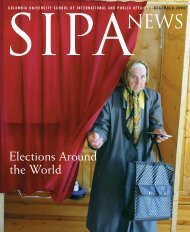Promoting IDPs' and Women's Voices in Post-Conflict Georgia
Promoting IDPs' and Women's Voices in Post-Conflict Georgia
Promoting IDPs' and Women's Voices in Post-Conflict Georgia
- No tags were found...
Create successful ePaper yourself
Turn your PDF publications into a flip-book with our unique Google optimized e-Paper software.
<strong>in</strong>ternational <strong>in</strong>itiatives seek<strong>in</strong>g to <strong>in</strong>crease cooperation between IDPs <strong>and</strong> local governments couldallow for greater IDP agency <strong>in</strong> local decision-mak<strong>in</strong>g. However, a systematic analysis of such effortsrema<strong>in</strong>s to be done.Interest <strong>in</strong> Greater Gender Balance <strong>in</strong> Political RepresentationJust as IDPs’ needs <strong>and</strong> participation do not occupy a central priority <strong>in</strong> current political discourse, nordoes women’s greater <strong>in</strong>clusion <strong>in</strong> governance. Mar<strong>in</strong>a Tabukashvili of the Taso Foundation, whichworks on women’s political empowerment, noted that, “There is not much attention [paid to women’spolitical participation] from the top. It is not considered an important issue.” 429 For one th<strong>in</strong>g, genderedeffects of policy do not seem to be ord<strong>in</strong>arily considered dur<strong>in</strong>g the policymak<strong>in</strong>g process. This isperhaps chang<strong>in</strong>g as the Gender Equality Council <strong>in</strong> the <strong>Georgia</strong>n Parliament pushes for a gendered lensto <strong>in</strong>fluence policymak<strong>in</strong>g <strong>and</strong> more political parties develop women’s w<strong>in</strong>gs <strong>and</strong> organizations. TamarTavartkiladze of UN Women, for example, notes the vocal support that the chairman of Parliament,David Bakradze, gave to the <strong>in</strong>clusion of women <strong>in</strong> peace processes through the National Action Plan on1325, say<strong>in</strong>g that his endorsement of the plan was “very powerful.” 430 There is also evidence thatpolitical parties are <strong>in</strong>creas<strong>in</strong>gly will<strong>in</strong>g to view women as leaders, as some have established women’sw<strong>in</strong>gs <strong>and</strong> other party structures promot<strong>in</strong>g women’s <strong>in</strong>volvement <strong>and</strong> leadership. Still, a senior fellowat the <strong>Georgia</strong>n Foundation for Strategic <strong>and</strong> International Studies says that “there is a not a great socialawareness among the general public of the mean<strong>in</strong>g <strong>and</strong> importance of <strong>in</strong>clud<strong>in</strong>g more women” <strong>in</strong>politics. He added that “given the absence of strong pressure,” a lack of a correspond<strong>in</strong>g politicalappetite for work<strong>in</strong>g to <strong>in</strong>clude more women <strong>in</strong> policymak<strong>in</strong>g also exists. 431 This analyst notes that giventhese circumstances, it is likely that f<strong>in</strong>ancial <strong>in</strong>centives for political parties to <strong>in</strong>clude more women arelikely to be the most important motivat<strong>in</strong>g force encourag<strong>in</strong>g political parties to promote women’sleadership. 432 For the time be<strong>in</strong>g, however, it can be said that <strong>in</strong> general women IDPs face a k<strong>in</strong>d ofdouble exclusion <strong>in</strong> hav<strong>in</strong>g their voices <strong>and</strong> gender-specific needs considered <strong>in</strong> policymak<strong>in</strong>g.IDPs as a Constituency – Does the “IDP Vote” Matter?While politicians clearly seek to court the “IDP vote” – IDPs wryly report receiv<strong>in</strong>g a cha<strong>in</strong> of politicalparty representatives at their collective centers <strong>and</strong> settlements around election time – it is debatablewhether or not IDPs currently represent a constituency that carries significant weight with politicians.Many political actors seem to feel that they do not need to make IDP issues a priority <strong>in</strong> their platforms.IDPs’ lack of political clout results from a variety of factors. IDPs have a reputation for be<strong>in</strong>g bothpolitically apathetic (as discussed previously) <strong>and</strong> firmly aligned with the rul<strong>in</strong>g party. For many years,<strong>in</strong>sofar as the limited data on IDP vot<strong>in</strong>g habits suggests, a solid majority of IDPs voted <strong>in</strong> favor of the429 Mar<strong>in</strong>a Tabukashvili, Personal Interview.430 Tamar Tavartkiladze, Personal Interview.431 Senior Fellow, Personal Interview.432 Ibid.82

















